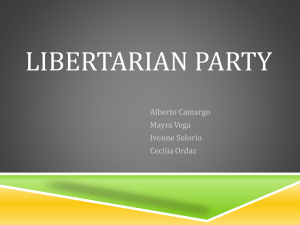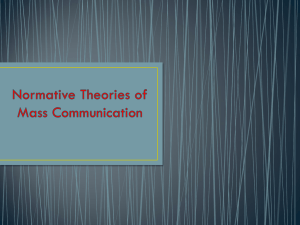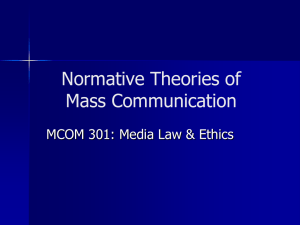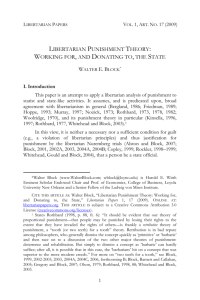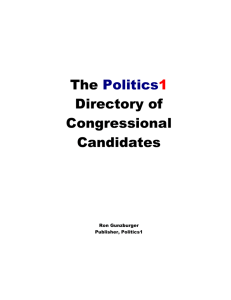Different Moral Theories
advertisement
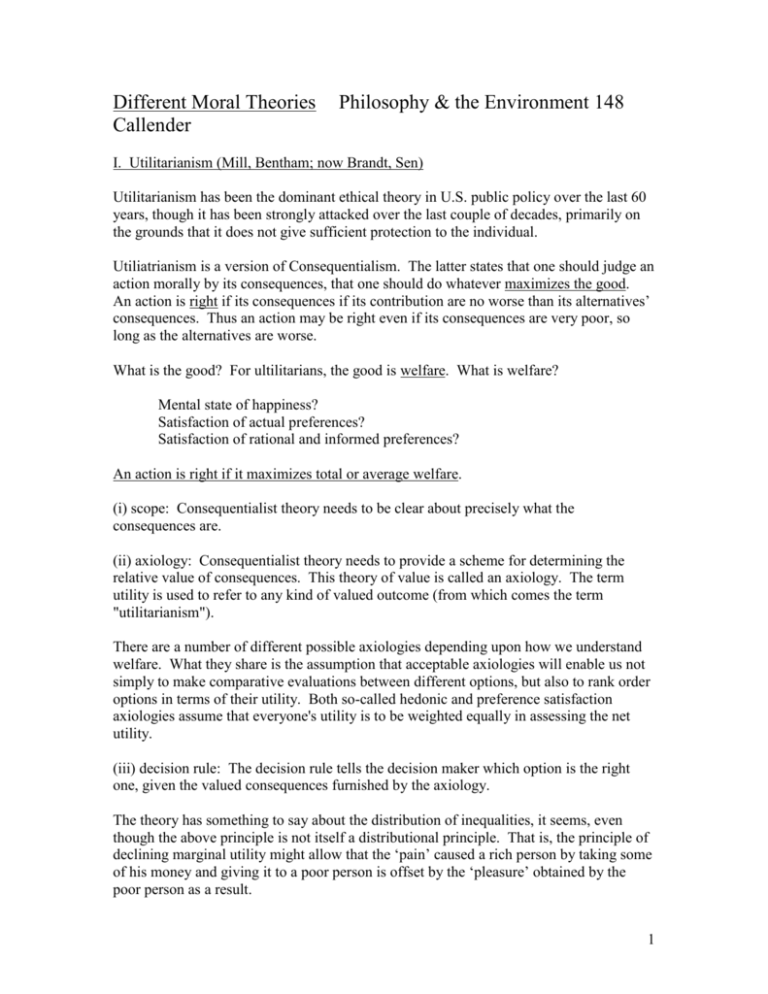
Different Moral Theories Callender Philosophy & the Environment 148 I. Utilitarianism (Mill, Bentham; now Brandt, Sen) Utilitarianism has been the dominant ethical theory in U.S. public policy over the last 60 years, though it has been strongly attacked over the last couple of decades, primarily on the grounds that it does not give sufficient protection to the individual. Utiliatrianism is a version of Consequentialism. The latter states that one should judge an action morally by its consequences, that one should do whatever maximizes the good. An action is right if its consequences if its contribution are no worse than its alternatives’ consequences. Thus an action may be right even if its consequences are very poor, so long as the alternatives are worse. What is the good? For ultilitarians, the good is welfare. What is welfare? Mental state of happiness? Satisfaction of actual preferences? Satisfaction of rational and informed preferences? An action is right if it maximizes total or average welfare. (i) scope: Consequentialist theory needs to be clear about precisely what the consequences are. (ii) axiology: Consequentialist theory needs to provide a scheme for determining the relative value of consequences. This theory of value is called an axiology. The term utility is used to refer to any kind of valued outcome (from which comes the term "utilitarianism"). There are a number of different possible axiologies depending upon how we understand welfare. What they share is the assumption that acceptable axiologies will enable us not simply to make comparative evaluations between different options, but also to rank order options in terms of their utility. Both so-called hedonic and preference satisfaction axiologies assume that everyone's utility is to be weighted equally in assessing the net utility. (iii) decision rule: The decision rule tells the decision maker which option is the right one, given the valued consequences furnished by the axiology. The theory has something to say about the distribution of inequalities, it seems, even though the above principle is not itself a distributional principle. That is, the principle of declining marginal utility might allow that the ‘pain’ caused a rich person by taking some of his money and giving it to a poor person is offset by the ‘pleasure’ obtained by the poor person as a result. 1 Worries. Can we make interpersonal comparisons of well-being? Whose welfare counts? This bears directly on the animal rights issue. Average versus total happiness? This bears directly on the population issue. Should pleasure from crime count toward the total ultility? Innocent person case; ‘happy’ slave society case, and so on. Utilitarianism suffers from many more concerns and difficulties than merely the above. But it remains a strong ethical theory because in principle at least one can simply calculate the right thing to do. One is given a clear guide to action (in theory) and one is also able to identify the points of dispute very clearly. II. Rights Theories (Hobbes, Locke, Rousseau, Kant, Nozick) Rights are a complicated set of permissions and constraints. A right for you to do X (say, strike) implies a correlative duty on others to not interfere with your performance of X. Rights-based theories specify (i) the moral rights that individuals are said to enjoy or have naturally, (ii) the legal rights that should flow from these moral or natural rights, and (iii) an argument to the effect that any rational person would recognize the moral force of these claimed rights. Regarding (iii)… Locke said that we can perceive them, and the American Declaration followed suit saying that they were self-evident. Kant gave another answer making use of the idea of equal respect for rational agents. Contractualists say they are justified because a rational group of people will agree to live by a certain set of moral rules. Depending on the theory, rights may be absolute or not absolute—that is, morally overridden or not. But usually they count much more than a consequentialist would ever allow. A. Libertarian Theory. (1) Libertarian theories limit the scope of public policy and hence government sharply, and hold that policies are justified only to the extent that they protect the life, liberty, and property of citizens against interference by others. The sole role of government is to provide these protections. Libertarian theory holds that the rational person would, out of pure self-interest, be willing to form or join associations that had as their purpose the securing of these protections. In particular, it is claimed that rational self-interest compels one to join such self-protection associations. (2) Libertarian theory limits itself to the recognition of various non-interference rights. 2 Libertarians sometimes explain their ethics by saying that it justifies only negative rights, that it levies only negative duties, i.e., duties of non-interference with others. Our obligations as citizens are not to do anything that would violate someone else's rights not to be interferred with. We are not obligated to perform any positive actions on behalf of others. In point of fact, many libertarian ethics do levy certain positive duties. (3) Libertarian limits Once we get beyond rights and duties of self-protection, it becomes difficult to justify (on libertarian grounds) any extension of state power into other areas of life. Libertarianism draws rather sharp limits upon what public authorities may do, and leaves a great deal of discretion to the private decision maker. It is useful to consider exactly what sorts of coercive environmental legislation a libertarian could (and could not) consistently accept. Coercive legislation coerces an individual or individuals in order to secure a result of some sort. Such legislation can be classified in terms of its intended goal(s) of the coercion: * prevent harm (or risk of harm) to other individuals. * prevent self-harm (paternalism). * prevent offense to others (e.g., nuisance laws). * secure a benefit for others. * secure a benefit for oneself. Libertarians are consistently able to support only legislation that is intended to prevent one individual from harming others. They cannot support environmental legislation that does not have this intent, e.g., nuisance laws, sign ordinances, etc. B. Egalitarian Theory. Egalitarians accept the validity of libertarian rights; however, unlike libertarians they would extend the terms of the social contract to include certain positive rights, which egalitarians term "opportunity rights." (1) Argument for the terms of the egalitarian contract. Libertarians argument for a social contract that includes only rights of non-interference by imagining the social contract that individuals in a "state of nature" would consent to. Egalitarians similarly ask what sort of contract would individuals consent to; however, they imagine a rather different contractual situation. This situation, which Rawls dubs the "original position," is one in which individuals are rational (i.e., they seek to maximize their own good) but they choose the terms of the contract from a position of fairness, specifically they deliberate on the terms of the contract from behind what Rawls dubs "a veil of ignorance " as regards their particular interests, liabilities, social class, family wealth, etc. What we get, then, as a social contract is the one that rational persons 3 would agree to, when we have stripped away all of the traits that would tend to bias the agreed upon contract against rational persons who lack the trait. (2) Positive Rights and Opportunities. Egalitarians assume that persons in this original position would choose a social contract that in addition to providing for libertarian protections would provide individuals with a reasonable share of primary goods, the things that make a decent life possible. Primary goods include food, shelter, security, and some discretionary income. They also include opportunities to learn, to work, to communicate, and to increase one's allotment of other primary goods. Because the positive rights recognized by egalitarian theories provide opportunities as well as protections, they are often described as opportunity rights. Some egalitarians speak of their theories as equal opportunity theories. Basically the terms of the egalitarian theory guarantee a minimally decent life and an opportunity to compete equally for a better than average life. Clearly, providing everyone with a reasonable share of primary goods would require recognition of certain positive duties on the part of others to provide these goods by taxation or other schemes. Limits of egalitarianism. Egalitarians, such as Rawls, assume that persons in the original position would not necessarily choose a strictly egalitarian social contract inasmuch as the nature of markets and need for incentives might dictate that some inequality in the distribution of primary goods might have the effect of providing more for everybody. But egalitarians would insist upon an equal distribution unless everyone would profit from an unequal distribution of primary goods. (3) Entitlements vs. goals. Because of the broad scope of the rights that egalitarian contracts recognize, viz, opportunity rights as well as non-interference rights, egalitarian theories run up against the obvious fact that we live in a world of scarcity. Societies are unable to provide everything that contractors might desire. There must be some ranking or prioritizing of opportunity rights. Egalitarians often distinguish between entitlements and goals, the former being those opportunity rights that a society in virtue of its wealth is obligated to guarantee, the latter being those opportunity rights that a society is not in a position to guarantee, but which it is obligated to work to secure. In effect, the labor of society is to turn goals into entitlements. In a relatively wealthy society like our own, education and healthcare are arguably entitlements, primary goods to which we should have a legal right, inasmuch as they are prerequisites for opportunities that society can afford to satisfy; in other, less wealthy society, they may only be goals. The crucial point here is that for egalitarian theories there has to be a prioritizing of opportunity rights. 4
